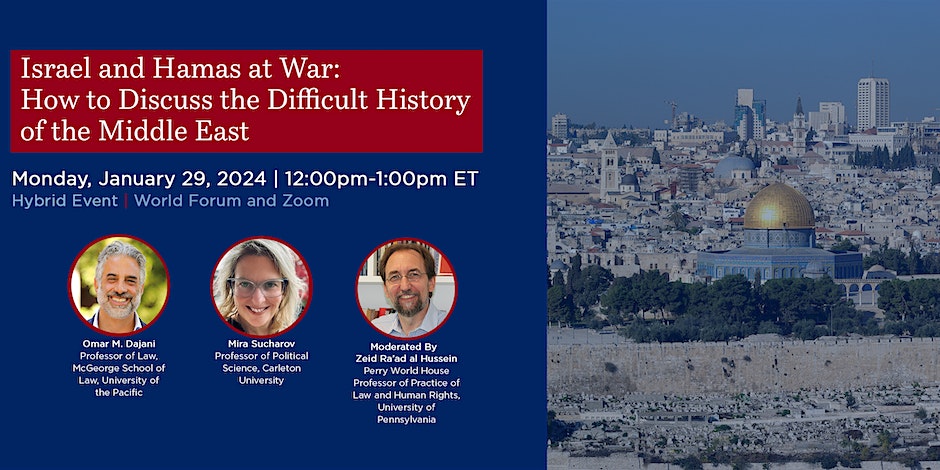How to Discuss the Difficult History of the Middle East

Date/Time
Date(s) - 01/29/2024
12:00 pm - 1:00 pm
Location
PERRY WORLD HOUSE
Categories
Cost:
FREE USD
Contact Person:
Email:
Website:
https://www.eventbrite.com/e/how-to-discuss-the-difficult-history-of-the-middle-east-registration-795576981167
Phone:
Organization:
Perry World House
Philadelphia, PA.
A discussion with Omar Dajani and Mira Sucharov about Middle East history, and how differences do not need to divide people.
About this event
- 1 hour
- Mobile eTicket
Over the last several months, the peoples of Israel-Palestine have suffered trauma on a scale that is unprecedented even for two nations painfully familiar with tragedy. The terrorist attack launched by Hamas on October 7 resulted in the greatest loss of civilian life of any day in Israel’s history. And Israel’s subsequent military assault on the Gaza Strip has led to more civilian deaths than twenty years of war in Afghanistan. Across the country and around the world, debates about the causes of these horrific developments and the best way forward have been intense and polarizing. Tensions remain high, and people are struggling to have civil discussions with those who have different perspectives.
This session will bring together two experts who have been working across the ethnic divide to explore the most difficult dimensions of the situation in Israel-Palestine and help others find ways to have productive discussions about it. For the last two years, Omar Dajani, a Palestinian-American professor of law, and Mira Sucharov, a Canadian-Jewish professor of political science, have been traveling together across Israel-Palestine as they write a book and develop a podcast about their experiences. Over the course of building a professional partnership and friendship, they have learned many things about themselves and each other, but one stands out: overcoming differences in views is easier when you start by communicating about values.
And that is the point at which their lectures begin. Examining the region’s history from two distinct backgrounds, they contend with the markedly different ways in which their own communities—and the people they encounter—see and talk about occupation, resistance, legitimacy, freedom, security, self-determination, and even what it means to be Jewish and Palestinian. They grapple with the distinction between justifying and understanding actions and the tension that sometimes arises between attachment to community and attachment to values. And they consider whether Israelis and Palestinians can envision a shared future without facing the past.
Join Perry World House for what promises to be an enriching, enlightening, and informative conversation with two Middle East experts who strive to show their students and broader communities that different experiences and different perspectives do not have to divide people, even when the subject is a complex region with a painful history. Dajani and Sucharov will discuss the history of the region, the tragedy of October 7 and beyond, and how to have difficult conversations about both.
SPEAKERS
Omar M. Dajani is professor of law at the McGeorge School of Law, University of the Pacific, in Sacramento, California, where he teaches Contracts, Public International Law and U.S. Constitutional Law, among other subjects. He formerly served as a legal advisor to the Palestinian negotiating team in peace talks with Israel, participating in the summits at Camp David and Taba, before joining the office of the United Nations Special Coordinator for the Middle East Peace Process (UNSCO). He has since consulted on a variety of legal infrastructure development and conflict resolution projects in the Middle East and elsewhere—for institutions including the U.S. Department of State, the Norwegian Peacebuilding Resource Center (NOREF), the Center for Humanitarian Dialogue, and the European Council on Foreign Relations, and he currently serves on the board of A Land for All, an Israeli-Palestinian peace movement. His book, Federalism and Decentralization in the Contemporary Middle East and North Africa (co-edited with Aslı Bâli) was published by Cambridge University Press in 2023.
Mira Sucharov is professor of political science at Carleton University in Ottawa, Canada. She is the author or editor of five books, including, most recently, Borders and Belonging: A Memoir (Palgrave Macmillan, 2021), and Social Justice and Israel/Palestine: Foundational & Contemporary Debates (University of Toronto Press, 2019, co-edited with Aaron J. Hahn Tapper). She has published over thirty-five scholarly articles and book chapters and is a ten-time teaching award winner, including having received the top university teaching award in Ontario. Her many op-eds and articles have appeared in the Globe and Mail, Haaretz, the Forward, the Daily Beast, the Toronto Star, the Jerusalem Post, the Huffington Post, JTA, and Jewish Currents. She has appeared on CBC, CTV, Global News, Agence-France Press, and NPR affiliate KDNK; and has been quoted in Vox, the New York Times, Buzzfeed, the Globe and Mail, the National Post, and Al Jazeera. She is currently working with Omar Dajani on a podcast about Palestinian and Jewish life in Jaffa called “The Vacant Lot,” and, also with Omar Dajani, a book (under contract with Prometheus) about emotions and attachment in Israel-Palestine.
MODERATOR
Zeid Ra’ad Al Hussein served as the United Nations High Commissioner for Human Rights from 2014 to 2018. He was awarded the Stockholm Prize for human rights in 2015 and the Tulip Prize in 2018. He is currently the President and CEO of the International Peace Institute and Perry World House Professor of the Practice of Law and Human Rights at the University of Pennsylvania. In 2019, Al Hussein was appointed a member of The Elders, an independent group of global leaders working for peace, justice, and human rights, founded by Nelson Mandela. He served twice as Jordan’s ambassador to the United Nations (in New York) and once as Jordan’s ambassador to the United States. In January 2014, he served as president of the UN Security Council and earlier, in 2002, was elected the first president of the governing body of the International Criminal Court (ICC) — guiding the court’s growth in its first three years from 2002 to 2005. He also represented Jordan twice before the International Court of Justice (ICJ). From 1994 to 1996, he served as a UN civilian peacekeeper with UNPROFOR. Al Hussein holds degrees from Johns Hopkins University and the University of Cambridge.










